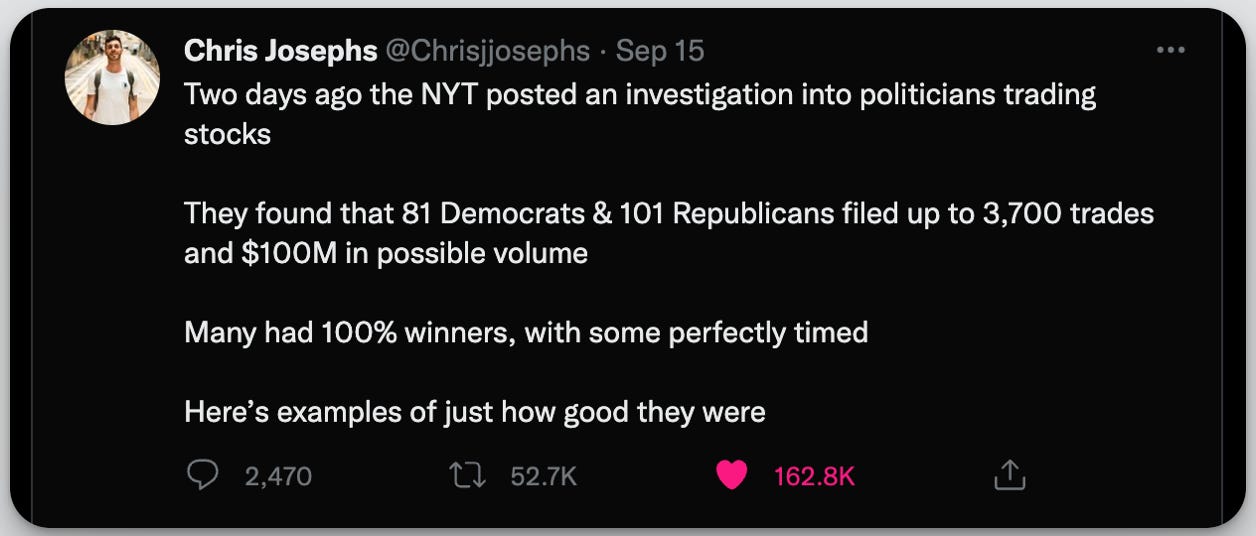M&Ms: Afraid of Commitment
Hey Team,
Young people are afraid of commitment.
This week, I had a nice conversation with a young man who just finished college. He got a nice high-paying job in tech and was asking me for some investment advice.
He wants to invest in real estate but is afraid of being tied up in a mortgage.
But without the right kind of risk and commitment, it is hard to get ahead and build something meaningful. And it's going to be hard to build wealth.
My response to this young man was that you could simply take on a mortgage you could afford. In addition, you could wait and buffer six months' worth of payments and maintenance. Then, even if you cannot rent it and you lose your job at the same time (two unlikely events occurring simultaneously), you can still make payments for six months from your savings buffer while you figure things out.
I could tell he was still uneasy; I get it. Something about that kind of debt against your name feels scary.
I then asked, "hypothetically, if things start going south for you and you cannot afford that mortgage, what will be the first thing you do?" He responded with, "I'd look for a way to make more money. I would first ask for a raise but then maybe even change jobs if I can find something that pays more."
“Exactly,” I said, “you are not some spectator in your own life; there will always be things you could do.”
The next question I had for him was, "what do you think would happen if you approached your boss and said I need a raise because I cannot afford my mortgage; I am falling behind?"
I've been on both sides of that question more than once. I've been there as the manager, hearing from folks who had a need. And I've been there as someone from poverty who had a need myself; I have only ever seen things play out one way.
When the person with the need is doing a great job, a good manager will do everything in their power to help. That manager would attempt every possible way to get that raise, not limited to escalating for exceptions or even putting the person up for a promotion. It would be in the managers best interest, and I will get into that in a second.
I then asked this young man, "If two young people are doing a great job, but one has a bigger need, which one would the manager pick to help first, you think?" This question is almost hypothetical because even the Bible in the parable of the lost sheep tells us what would happen. If you don't know the parable, the shepherd leaves behind the other 99 sheep to help the one in trouble.
If you have a commitment you cannot escape and you tell your manager about it, you are verbally communicating your need and sharing something significant non-verbally. You communicate without ever threatening to quit that you will be forced to do whatever it takes, including leaving your job for a higher-paying one. Any leader worth their salt will understand this.
The moment you get a higher salary offer, regardless if the new role is good for you or not, you will take it. People, when they have a pressing need, do crazy things, including leaving a good job for a worse job. Or a good team for a worse team just for the money. Because they need the money. And leaders intuitively understand that when you say you can't pay your mortgage, that's as big of a need as any.
Maybe you think you might feel uncomfortable sharing with your manager that you need a raise because you might foreclose or go bankrupt. And some people will advise you to keep it strictly business with your manager and not to share anything personal. I can promise you that people who give that sort of advice didn't have to climb out from the bottom.
My favorite rapper Nipsey Hussle, who also climbed out from the bottom, said, "when you stop eatin', that affects your weight. And when you get hungry, that affects your brain." And to me, that means that if your back is against the wall and you're really hungry, you will pull every lever available. You will do whatever it takes.
I told this young man don't worry so much about what might happen with a mortgage you can afford, which will also generate income for you; you should be far more worried about what might happen to you if you have no commitments and no needs.
Three Tweets that made me think this week:
I’ve witnessed what Paul is describing many times, across multiple companies.
This is a big reason startups can come out of no where and beat even really large incumbents.
Startups don’t have any thick accumulated scar tissue slowing them down.
A fascinating thread, with some serious allegations, about our law-makers in America front running and cheating in the stock market.
Both sides seem pretty good at it, perhaps the only thing politicians seem to be really good at.
My friend Chris Wong joked that “maybe this is one way these politicians can help their constituents. Help them front run the market.”
That is pretty funny but there is nothing funny about those allegations.
Charlie Mungur reminds those of us still in the game, working hard, trying things to grab good opportunities by the horn.
As he says, we wont get that many, and most of those opportunities will require some level of commitment from us.
That’s why I say if you find something good, get into it.
Three Memes that made me laugh and think this week:
As someone who is an engineer and has looked at a ton of homes when trying to find a good investment, that floor plan captures the problem pretty well.
I enjoyed this one because it applies to a lot of things, including building software.
If we priced things that way, we would get better outcomes.
A short update from me:
I am honored and humbled that the Write of Passage team dedicated an issue to me in their newsletter.
Since I have bought their lifetime program, I no longer get their marketing material. But several people pinged me to let me know I was in there. Folks were even kind enough to give me a link to read it.
And as that feature says, the Write of Passage program was very much transformational for me. I took the program for the first time exactly a year and a half ago, and a lot has changed for me since then. And while I am biased, having taken it so many times and getting picked to mentor there, I highly recommend the program to anyone wanting to write more meaningful long-form content.
The best comparison I have for Write of Passage is that it is the Harvard School but for writing.
The caliber of people and intellect is at the highest level I have found anywhere. The quality of the program is at the highest level of any learning I have been a part of. And the quality of the connections and relationships I built up has definitely been at that level too. I met founders, VCs, engineers, and so many more people from all sorts of interesting fields and backgrounds who also wanted to improve their writing.
The program runs every six months, and the last day to sign up for this one that starts in October is next week.
By the way, they aren’t paying me to say any of this, and as usual, I would never recommend anything to you that I didn’t believe in myself. But if you have been reading this newsletter for a little while, it should be no secret that Write of Passage and the Small Bets community are my two favorite courses and communities on the internet.
Thank you for reading. I hope you have a wonderful weekend.
-Louie
P.S. you can reply directly to this email, or you can email me at louie@louiebacaj.com about this edition or any topics you’d like to discuss.









Great point around organization scar tissue.
One thing that keeps me up at night is the scar tissue in large international development organizations that makes it equally impossible for them to get anything done anymore. But they aren't disrupted in the same way as for-profit corporations because revenue models and incentives are flipped on their head in the social sector.